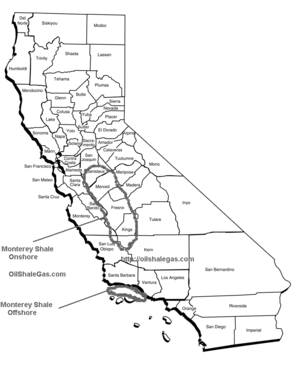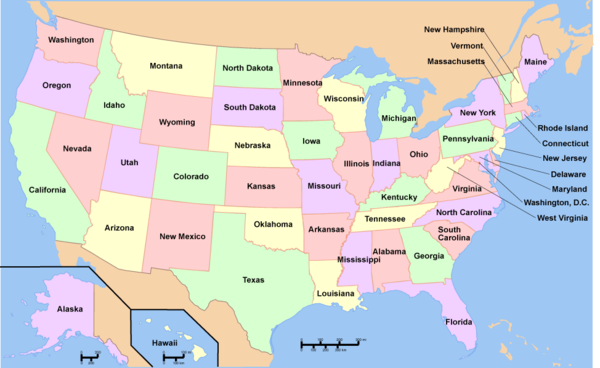Monterey Shale
{{#badges: FrackSwarm|Navbar-fracking}} The Monterey Shale is a rib-shaped formation that extends from northern California down to the Los Angeles area, offshore, and onto the outlying islands. The Monterey Shale Formation is currently producing oil & natural gas and is an emerging shale play. Counties include Kern County, Orange County, Ventura County, Monterey County and Santa Barbara County, California.
The Monterey Shale is composed of a concoction of many substances including folded mud deposits and highly dense chert. The CEO of Venoco has stated that there might be up to 300 billion barrels of oil in the Monterey Shale, although the company's first well was labeled " uneconomical." The Monterey Shale, while it consists of both oil and gas, is primarily oil. According to oilshalegas.com, "extraction is focused mainly from vertical drilling techniques versus the costly horizontal technique used for most shale gas plays." Natural Gas estimates in the Monterey Shale stop at between 1.5-2.0 trillion cubic feet.[1]
Monterey Shale is considered by some to be "arguably the largest shale play in the US."[2] However, the complexity of the geology, having experienced seismic activity and coastal basins and steep geography, make access to the deposits more difficult than other areas where fracking is taking place.
In a February 2013 article in The New York Times, it was reported that California's Monterey Shale contains two-thirds of the U.S.’s shale oil reserves. The oil field spans 1,750 square miles from Southern to Central California. The Times reported that "the Monterey Shale could turn California into the nation’s top oil-producing state and yield the kind of riches that far smaller shale oil deposits have showered on North Dakota and Texas."[3]
Contents
History
Production from Monterey Shale began in California's Santa Maria Basin in 1900. However, industry analysts note that the reasons for this lack of development are many, according to Michael G. Edwards, vice president of corporate and investor relations for Venoco. California is probably the only state in the Lower 48 to be dominated by the large oil companies. These companies still operate oil fields such Midway-Sunset, Belridge, and Kern River, but they haven’t yet sought deeper reservoirs. Leasing lands for potential gas development also are noted as being difficult due to the amount of private lands in the state.[2]
Shale makeup
The Monterey Shale is a rib-shaped formation that extends from northern California down to the Los Angeles area, offshore, and onto the outlying islands. The Monterey Shale Formation is currently producing oil & natural gas and is an emerging shale play. Counties include Kern County, Orange County, Ventura County, Monterey County and Santa Barbara County, California.
The Monterey Shale is composed of a concoction of many substances including folded mud deposits and highly dense chert. The CEO of Venoco has stated that there might be up to 300 billion barrels of oil in the Monterey Shale, although the company's first well was labeled " uneconomical." The Monterey Shale, while it consists of both oil and gas, is primarily oil. According to oilshalegas.com, "extraction is focused mainly from vertical drilling techniques versus the costly horizontal technique used for most shale gas plays." Natural Gas estimates in the Monterey Shale stop at between 1.5-2.0 trillion cubic feet.[4]
Monterey Shale is considered by some to be "arguably the largest shale play in the US."[2]
Job creation
It has been reported that, if developed, Monterey Shale could add as many as 2.8 million jobs by 2020 and increase tax revenue for state and local governments by $4.5 billion, according to a study by University of Southern California academics. Industry experts believe the possibilities are potentially even larger.[5]
Companies operating or interested in Monterey Shale
- Occidental Petroleum
- Oxy
- Plains Exploration
- Newfield Exploration
- Berry Petroleum
- Canadian Natural Resources Ltd.
- Western Energy Production
- Zodiac Exploration
- Gasco Energy
- Venoco
Resources
References
- ↑ "Monterey Shale" California Oil & Natural Gas, accessed April 25, 2012.
- ↑ Jump up to: 2.0 2.1 2.2 "Monterey Shale - California's Sleeping Giant?" Rhonda Duey, E&P, June 1, 2011.
- ↑ "Vast Oil Reserve May Now Be Within Reach, and Battle Heats Up" Norimitsu Onishi, New York Times, February 3, 2013.
- ↑ "Monterey Shale" California Oil & Natural Gas, accessed April 25, 2012.
- ↑ "Monterey Shale Shakes Up California's Energy Future" National Geographic, May 27, 2013.
Related SourceWatch articles
Wikipedia also has an article on Monterey Shale. This article may use content from the Wikipedia article under the terms of the GFDL.
| This article is a stub. You can help by expanding it. |


